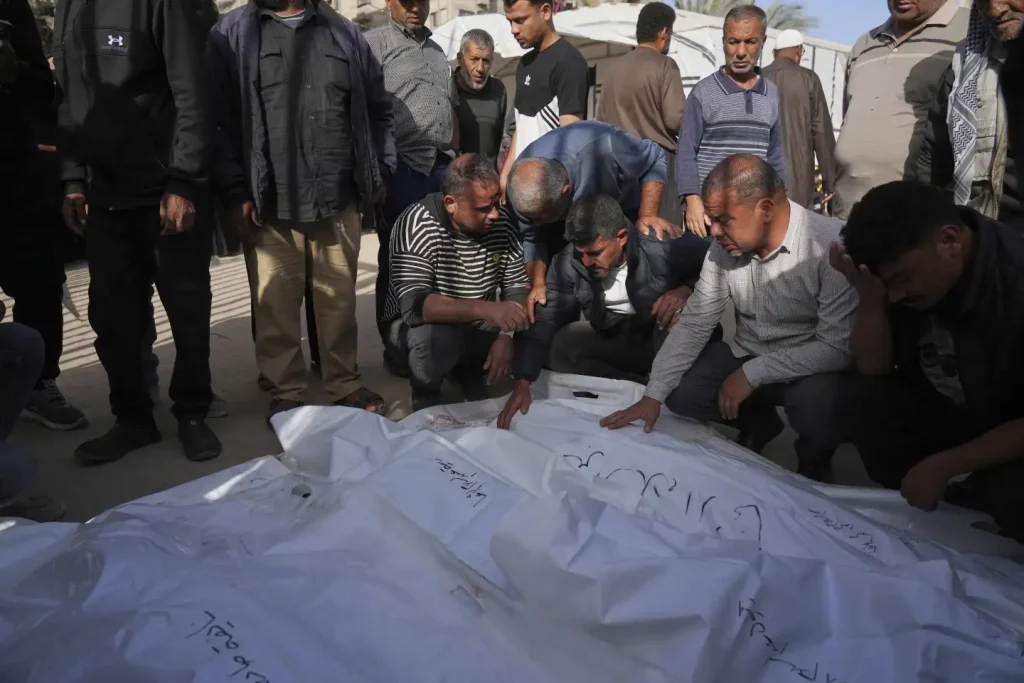
Israeli strikes overnight and into Sunday killed 13 people in the Gaza Strip, mostly women and children, according to local health officials.
Two of the strikes hit tents in the southern city of Khan Younis, each killing two children and their parents, according to Nasser Hospital, which received the bodies. Another five people were killed in strikes elsewhere, according to hospitals.
The Israeli military says it only targets militants and tries to avoid harming civilians. It blames Hamas for civilian deaths in the 19-month-old war because the militants are embedded in densely populated areas. There was no immediate Israeli comment on the latest strikes.
Israel has sealed Gaza off from all imports, including food, medicine and emergency shelter, for over 10 weeks in what it says is a pressure tactic aimed at forcing Hamas to release hostages. Israel resumed its offensive in March, shattering a ceasefire that had facilitated the release of more than 30 hostages.
The U.N. and aid groups say food and other supplies are running low and hunger is widespread.
Children carrying empty bottles raced after a water tanker in a devastated area of northern Gaza on Sunday. Residents of the built-up Shati refugee camp said the water was brought by a charity from elsewhere in Gaza. Without it, they rely on wells that are salty and often polluted.
“I am forced to drink salty water, I have no choice,” said Mahmoud Radwan. “This causes intestinal disease, and there’s no medicine to treat it.”
COGAT, the Israeli military body in charge of Palestinian civilian affairs, says enough aid entered during a two-month ceasefire this year and that two of the three main water lines from Israel are still functioning. Aid groups say the humanitarian crisis is worse than at any time in the 19-month war.
Trump to visit the region
U.S. President Donald Trump, whose administration has voiced full support for Israel’s actions, is set to visit Saudi Arabia, Qatar and the United Arab Emirates this week in a regional tour that will not include Israel.
The war began when Hamas-led militants attacked southern Israel on Oct. 7, 2023, killing some 1,200 people, mostly civilians, and taking 251 hostage. Fifty-nine hostages are still inside Gaza, around a third of them believed to be alive, after most of the rest were released in ceasefire agreements or other deals.
Israel’s offensive has killed over 52,800 Palestinians, mostly women and children, according to Gaza’s Health Ministry, which does not say how many of the dead were combatants or civilians. The offensive has destroyed vast areas of the territory and displaced some 90% of its population of around 2 million.
Israel recovers remains of soldier killed in Lebanon in 1982
In a separate development, Israel said it retrieved the remains of a soldier killed in a 1982 battle in southern Lebanon after he had been classified as missing for more than four decades.
The recovery of Sgt. 1st Class Tzvi Feldman’s remains brought more closure to a case that has plagued Israel for years. The Israeli military said his remains were recovered from deep inside Syria, without providing further details.
Israeli Prime Minister Benjamin Netanyahu visited Feldman’s surviving siblings on Sunday and told them that the overthrow of Syrian President Bashar Assad late last year led to an “opportunity” that allowed the military and the Mossad, Israel’s foreign intelligence agency, to gather additional intelligence and eventually locate and retrieve the body, according to video released by his office.
Feldman went missing, along with five other Israeli soldiers, in a battle with Syrian forces in the Lebanese town of Sultan Yaaqoub. Several years later, two of the missing soldiers were returned alive to Israel in prisoner exchanges with Syria. The remains of another soldier were returned in 2019, after Russia said it had helped locate them in Syria, while the fate of the other two remained unknown.
Cases of soldiers missing for decades have a powerful emotional and political resonance in Israel, where military service is compulsory for most Jewish men.